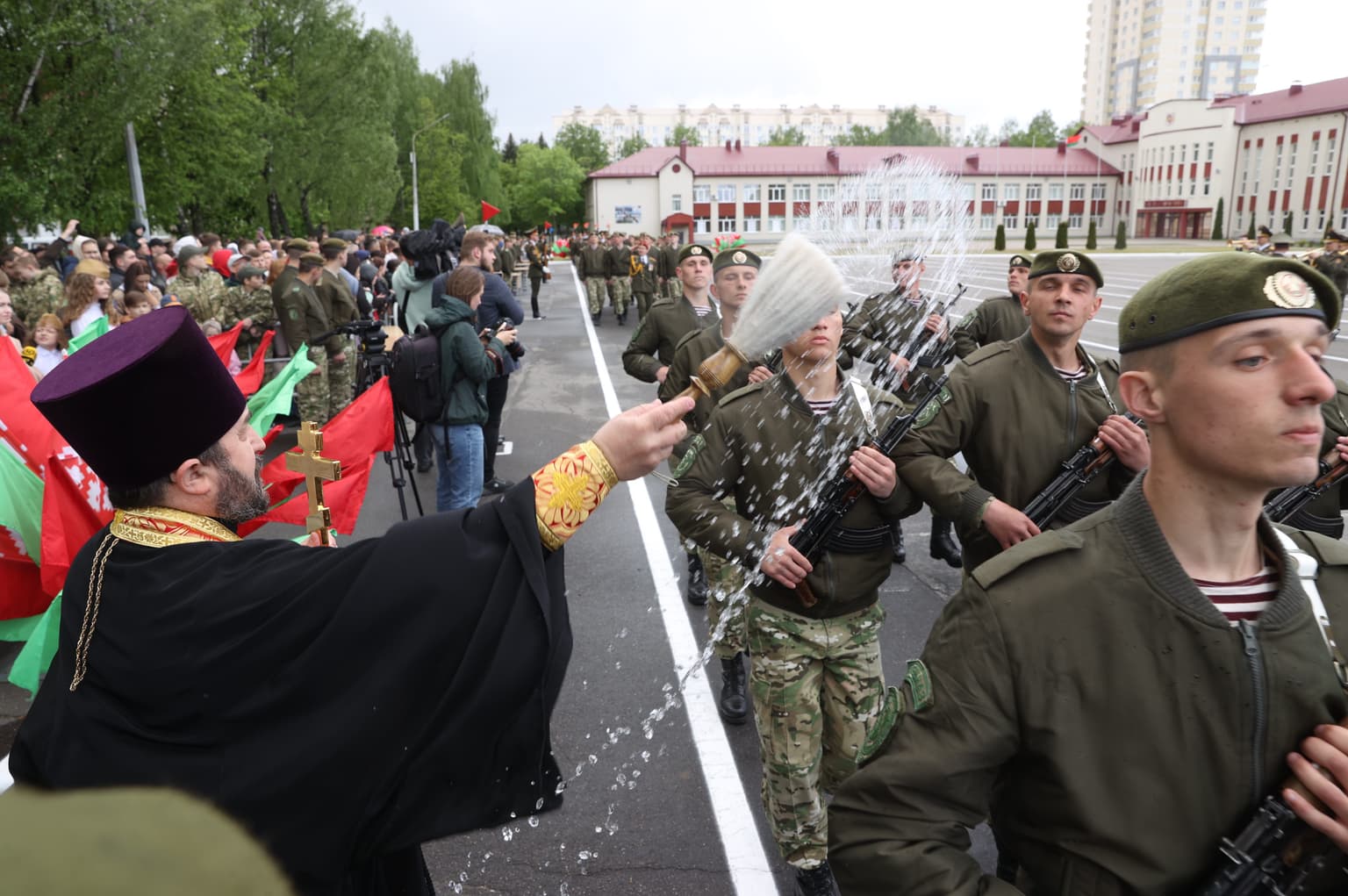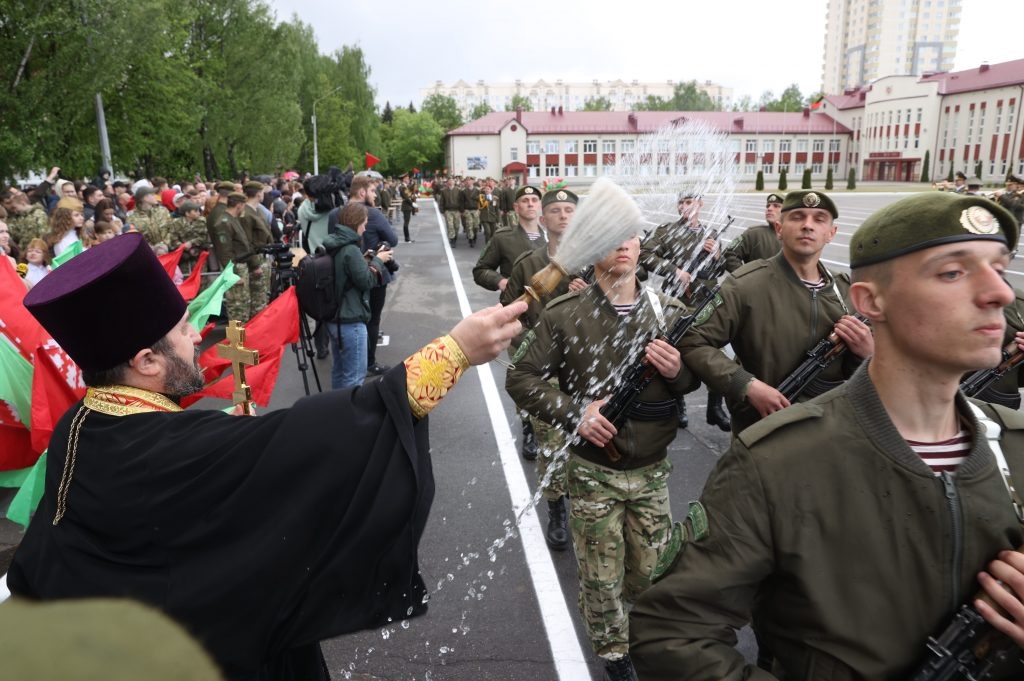Belarus Weekly: Lukashenko continues to threaten to invade Ukraine, creates southern military command, conducts drills near border

Belarusian dictator Alexander Lukashenko continues to threaten to invade Ukraine, has created a separate southern military command, is conducting military exercises on the border with Ukraine, and plans to establish a new defensive “people’s militia.”
Amendments to Belarus’ criminal code making attempted acts of terrorism punishable by death have also come into force this week, and the country’s once-booming IT sector has set the record for labor outflow.
The Kyiv Independent is continuing to provide readers with a weekly roundup that will help explain current events in Belarus. To receive the Belarus Weekly newsletter subscribe via this LINK.

Belarus creates southern operational command
On May 26, Lukashenko announced the establishment of a third operational command within Belarus’ army. The command is to be stationed in southern Belarus, near the country’s border with Ukraine, and constitutes an addition to the already-established western and northwestern operational commands. According to Belarus’ Defense Minister Viktor Khrenin, the country is also planning to create a “people's militia,” although it is currently unknown when and how it will be implemented.
As of May 10, Belarus has continued to conduct “surprise” military inspections, which it says is a response to NATO’s military drills. Belarusian officials have repeatedly accused Ukraine of threatening its security, although no evidence supporting these claims has been presented.
Additional military exercises set up for June
Belarus is planning to conduct military exercises from June 22 to July 1 in the country’s Gomel region, which borders Russia and Ukraine. Following allegations by Belarusian authorities of Ukrainian sabotage groups at the border, Belarus has imposed a ban for its citizens from visiting the border areas of the regional districts of Brahin, Loyew, and Khoiniki, until September.
According to the Belarusian state-controlled TV channel ONT, Belarus has deployed mechanized infantry, mortar crews, artillery, an anti-aircraft missile regiment, and drones to reinforce its border.
Ukraine denies the presence of Ukrainian subversive groups at the border and is also fortifying its defenses along its border with Belarus.
Tsikhanouskaya opens office in Kyiv
Amid the Belarusian government’s continued support of Russia, the country’s opposition party under Sviatlana Tsikhanouskaya has opened an office in Kyiv. Valeriy Kovalevsky, a member of Tsikhanouskaya’s team, made the announcement on May 26.
The team arrived in Kyiv on May 24, delivering humanitarian aid to Ukraine. The team’s representative office will focus on tackling urgent issues facing Belarusian nationals in Ukraine, including problems of migration and the blocking of Belarusian bank accounts.
Following Russia’s full-scale invasion of Ukraine on Feb. 24, the National Bank of Ukraine issued a resolution blocking the bank accounts of Russian and Belarusian citizens. One of the first items on the list, according to Kovalevskiy, is the development of joint positions on international issues, such as sanctions against the Belarusian regime.
Ukraine is one of the few countries in the region that have yet to hold an official meeting with Tsikhanouskaya.
In Tsikhanouskaya’s interview with the Kyiv Independent, she said that she understand that “they (Ukraine) don’t want any public engagement with Belarus’ democratic forces because it can provoke an escalation from Lukashenko and Moscow.”
Belarus-engineered migrant crisis at Polish border continues
Polish journalist Peter Czaban published a video on May 26 of men in military[c] uniforms beating migrants with batons at the Poland-Belarus border. The migrants in the video are shown screaming for help in Spanish, saying that there is a pregnant woman among them. Polish border guards are shown trying to convince their Belarusian counterparts to help the migrants, rather than beat them. Belarus’ State Border Committee has confirmed the incident but has blamed Poland for attempting to organize an illegal border crossing.
In late 2021, Belarus welcomed tens of thousands of immigrants from countries such as Syria, Lebanon, and Iraq, and moved them towards its border with Poland. Triggered by Belarus’ deteriorating relations with the EU, as well as the fraudulent 2020 Belarusian presidential election, the crisis reached its peak in Nov. 2021, when 3,500 migrants were forced to set up camp on the Belarusian side of the border and attempted to cross into the EU.
In 2022, Poland stopped more than 4,000 attempts to illegally cross into the EU and built a 60-kilometer wall. The crisis has since subsided by the end of 2021, although dozens of illegal border crossing attempts are still registered daily.
Belarus sentences citizens to 22 years in prison for ‘attempted terrorist attack,’ charges Tsikhanouskaya in the same case
Belarusian national Viachaslau Maleichuk was found guilty during his trial on May 30, sentencing him to 22 years in a penal colony. As of May 29, being charged with “attempted acts of terror” may lead to capital punishment.
On March 26, 2021, Belarus’ KGB claimed it had prevented two acts of terror, publishing a video of Maleichuk allegedly carrying out an act of terrorism instructed by BYPOL, an association of exiled former Belarusian security officials.
According to the KGB, 18 people are suspects in this case, including Sviatlana Tsikhanouskaya and Belarusian politician Pavel Latushko. These individuals are now listed as individuals involved in terrorism and may result in charges for those who interact with them or send them financial assistance.
Belarus’ KGB labels Maria Kalesnikava, Maxim Znak terrorists
Belarus’ KGB added 15 new names to its “list of terrorists” on May 24. Among them are Maria Kalesnikava and Maksim Znak, associates of Viktor Babariko, Lukashenko’s political rival who was sentenced to 14 years in prison after attempting to run in the 2020 presidential elections.
Earlier, Kalesnikava and Znak were sentenced to 11 and 10 years in prison, respectively.
Being labeled as terrorists would preclude them from receiving any money, as those who continue to transfer funds to them would be criminally liable for “financing terrorism.”
Belarusian IT sector facing unprecedented outflow
In April, a record-breaking number of IT specialists left their jobs in Belarus. According to deby.io, over 3,000 people resigned and only 938 were hired. Since the start of 2022, over 8,000 workershave resigned from their posts in Belarus.
The industry that accounted for 6.5% of Belarusian GDP and was responsible for 30% of the country’s exports in 2019 is now facing yet another outflow of employees and businesses caused by its participation in the war against Ukraine and Lukashenko’s repressive measures domestically.
If you’re finding the Belarus Weekly useful, consider becoming our patron on Patreon or donating via GoFundMe. Start supporting independent journalism today.










